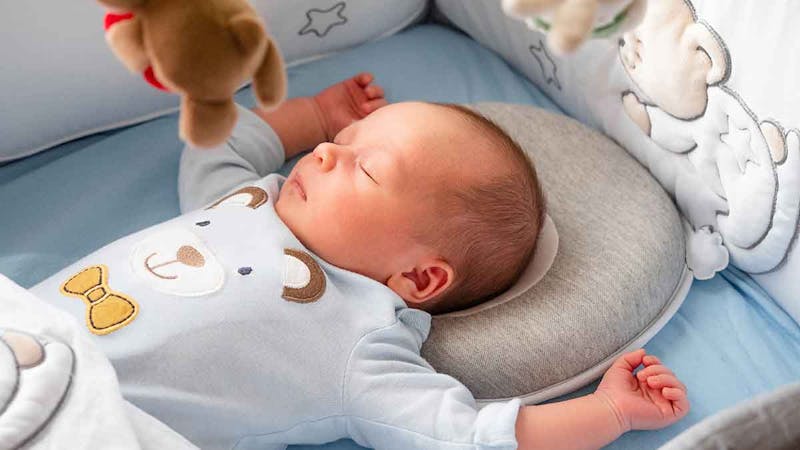
The U.S. Food and Drug Administration (FDA) is warning parents and caregivers not to use infant head shaping pillows due to the risk of suffocation and death.
Infant head shaping pillows are typically small pillows with an indent or hole in the center designed to cradle the back of an infant’s head. These pillows are not FDA-approved and disregard the safe sleep recommendations of the American Academy of Pediatrics (AAP). AAP recommends that infants be put to sleep on their backs, on a separate, flat and firm sleep surface without any bumpers, loose bedding, pillows or stuffed toys.
The pillows are sold by major retailers, including Amazon, and are still readily available for purchase, notwithstanding the FDA warning. Manufacturers market these devices with claims that they will improve an infant’s head shape and symmetry, or prevent or treat medical conditions, such as flat head syndrome, which is a flat spot on the back of a baby’s head, technically known as plagiocephaly. These representations tap into a common worry of new parents. A study published in the international, peer-reviewed journal “Child: Care, Health and Development” in 2016 found that parents were “willing to do anything” to prevent plagiocephaly — including using products or sleeping positions that are contraindicated under sudden infant death syndrome guidelines — because they were worried that plagiocephaly would permanently affect their child’s “looks.” Some parents even thought that plagiocephaly would affect their child’s development.
The FDA warning explains that flat head syndrome will go away on its own as an infant grows, is not painful and does not cause any developmental concerns. The FDA is not aware of any demonstrated medical benefit from use of these devices, and they may even delay necessary evaluation and management of more serious conditions, such as craniosynostosis, which is a birth defect in which the bones in a baby’s skull join together too early before the baby’s brain is fully formed.
The FDA recommends that parents who are concerned about an unusual head shape should seek advice from their infant’s healthcare provider. The FDA has cleared medical devices including caps, helmets and head bands that can be prescribed by a doctor for treatment of infant head deformities.
What Should I Do If My Baby Has Been Injured by an Infant Head Shaping Pillow?
Alan M. Feldman, a co-founding partner and product liability attorney at Feldman Shepherd, recommends contacting a product liability attorney as soon as possible if your child has been injured by an infant head shaping pillow.
Feldman said that product liability law requires that all products be safe for their intended as well as expected use. “The dangers regarding the use of infant pillows are well known; manufacturers should not be disregarding the recommendations of the American Academy of Pediatrics and other well-recognized medical groups in the design of infant products,” Feldman said.
Feldman’s team at Feldman Shepherd, which includes partners Daniel J. Mann and Edward S. Goldis, has secured substantial recoveries on behalf of infants and young children who have been seriously injured or killed by children’s products, including baby slings, inclined sleepers, unstable furniture and magnetic toys.

